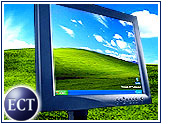
It may be coming half a decade late, but an independent software seller is now offering a service pack for Windows 98 Second Edition (SE), which Microsoft itself never got around to doing.
And just as Alper Coskun released his own “unofficial” service pack for the aging but well-liked Microsoft operating system, the software giant indicated it would be late again in delivering its newest update to Windows XP, known as Service Pack 2 (SP2).
However, analysts questioned the need for a 98 SE update and downplayed the significance of Microsoft’s delay on SP2, referring to a market that is eager but not yet screaming for the updates.
“I don’t think people are really barking for Longhorn right now,” Yankee Group senior analyst Laura DiDio told TechNewsWorld regarding Microsoft’s next-generation operating system, the release of which also has been repeatedly pushed back. “Customers do want to see those updates,” she added regarding SP2 for XP. “They also want to alleviate their security and patch management problems.”
Fading OS Freeware
Regardless of demand for it, Alper Coskun released last week the 98 SE service pack, which is described as “a self-extracting and self-installing pack like Microsoft’s update files” on the developer’s Web site.
“Microsoft has never released a service pack for Windows 98 SE,” Coskun said of the seven-year-old software. “But I made a service pack for Windows 98 SE users. It contains all Windows 98 SE updates from Windows Update site and more.”
Coskun touted new hot fixes, Adaptec ASPI 4.60 drivers, general USB mass storage device support, runtime libraries, custom Program Files directory support, additional tweaks and fixes for such issues as memory limitations in the operating system. The unofficial update does not include updates for Internet Explorer 6, DirectX 9, Media Player 9 and other applications, Coskun added.
Convenience, Not Support
Meta Group vice president Steve Kleynhans told TechNewsWorld that the Coskun update addresses the lengthy process of updating Windows 98 SE by packaging a series of fixes into a single install.
Kleynhans said that while Microsoft could have done something similar, it would have had to put a lot more time, effort and resources into testing and validating the update, which was not required for Coskun.
“This is not taking on support for Windows 98, which is what a lot of people had hoped would happen,” Kleynhans said. “This is a convenience for users who are still on Windows 98, but at this point most users would be better served updating to a newer operating system.”
Last Legs
The Yankee Group’s DiDio commented on Microsoft’s pulling of support for aging operating systems such as Windows 98 SE and its return of that support in limited form.
“They don’t want an abrupt change, and they don’t want to risk alienating the install base that’s there,” she said.
However, the analyst added that at the seven-year mark, “98 is really a moldy at this point.”
“Even as a consumer thing, it’s basically a 7-year-old system which is basically dying,” DiDio said.
SP2 Slowed
DiDio said that while the XP SP2 delay is not likely to cause too much trouble for Microsoft, customers of the software giant are anxious to put the update’s improved patching and security features to work.
“Customers want it when they see there’s some feature or fix that will improve the productivity of their workers or alleviate a pain point,” she said.
Gartner vice president David Smith told TechNewsWorld that the Microsoft delay on SP2 was caused by a recurring issue at the company but is still “very minor.”
“They continue to be things that get missed a lot,” Smith said of the delay. “It doesn’t help.”
Kleynhans, who referred to anticipation of and new product reliance on the forthcoming XP service pack, agreed that a two-week delay is of little concern.
“A couple of weeks here and there is not a big deal, particularly when you think about the scope of this service pack,” he said.




















































